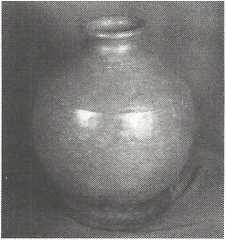Ghaṭam
By Swami Harshananda
Ghatam is the next important percussion instruments in the South Indian classical music vocal or instrumental, after the mṛdaṅgam. It is a large earthen pot carefully prepared so as to give a musical sound when beaten with the finger-tips and palms of the hands.
Unlike the mṛdaṅgam, the śruti or the tonic of the ghaṭam cannot be changed. Hence, the player of a ghaṭam generally keeps a large number of them to suit the different śrutis of the singers.
Modes of Music[edit]
Though the roots of Indian music are originally one, it gradually branched off into two systems:
- The North Indian - Uttarādi
- The South Indian - Dakṣiṇādi
The South Indian classical music retained its original flavor whereas the North Indian system attained a distinctness of its own. It happened due to the Persian influence wrought on it during the Mughal period.
References[edit]
- The Concise Encyclopedia of Hinduism, Swami Harshananda, Ram Krishna Math, Bangalore

